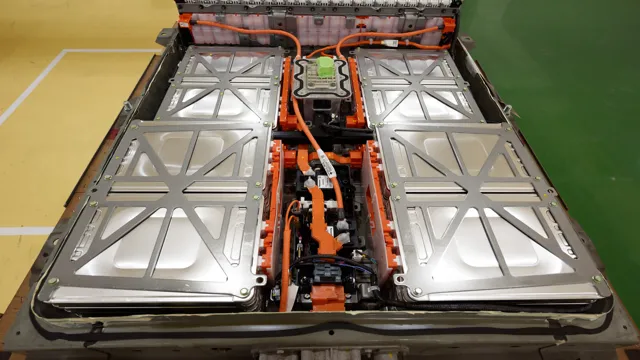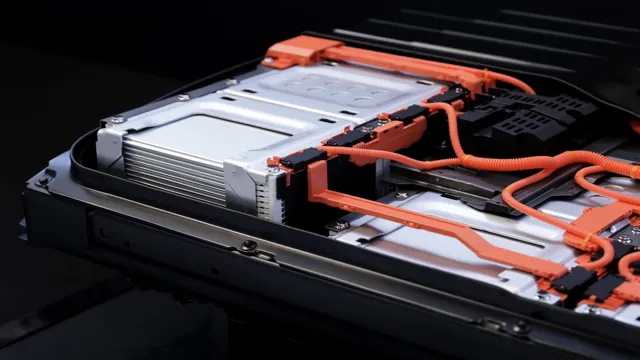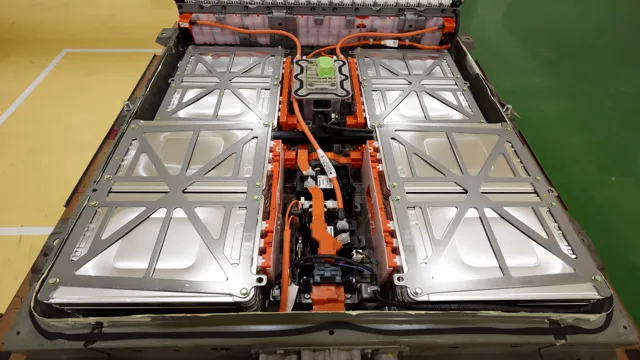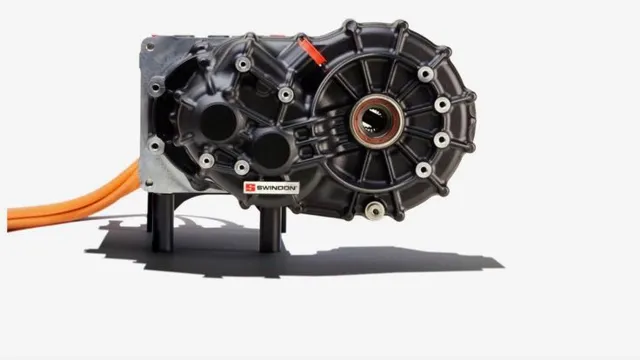Revolutionize Your Ride: The Ultimate Guide to Electric Car Battery Solutions
Electric vehicles (EVs) have been touted as the future of the automotive industry, promising to reduce emissions and minimize dependence on fossil fuels. While the concept of EVs is not particularly new, battery technology has been a significant barrier to their wider adoption. That is where battery solutions come into play, revolutionizing the EV industry in a significant way.
By addressing the limitations of the current battery technology, battery solutions aim to make EVs more practical and affordable for everyone. Battery solutions represent significant advancements in the technology that powers electric vehicles. They come in different shapes and sizes with varying energy densities, making them ideal for different applications.
Some battery solutions prioritize range, while others focus on charging time and cost-effectiveness. Each battery solution has its own strengths and weaknesses, making it crucial for automakers to choose the right one for their electric vehicles. Battery solutions are gradually closing the gap between electric and traditional gasoline-powered cars.
Thanks to their durability, energy efficiency, and designs that fit different electric vehicle models, switching to an EV is becoming more appealing to many. With more battery solutions coming to the market, it is only a matter of time before electric cars become the standard mode of transportation. In conclusion, battery solutions have a significant role to play in the evolution of electric vehicles.
They are making EVs more practical, affordable, and appealing to a broader market-base. So, are you ready to join the EV revolution and embrace the battery solutions that will change the way we drive?
Current EV Battery Limitations
Electric car battery solutions have come a long way, but there are still limitations that need to be addressed. One of the biggest limitations is range anxiety. Many electric vehicles (EVs) have a limited range that can make drivers anxious about running out of charge.
Another limitation is the time it takes to charge EV batteries, which can be much longer than filling up a gas tank. These concerns have led to efforts to develop faster and more efficient charging solutions, as well as larger capacity batteries. One promising option is solid-state batteries, which could provide a much greater range and faster charging times than current lithium-ion batteries.
Advances in battery technology will be key in making electric cars a more viable alternative to traditional gasoline-powered vehicles.
Limited Range and Charging Time
As electric vehicles gain in popularity, one major limitation that still needs to be addressed is range anxiety. Currently, the distance that an EV can travel on a single charge is limited compared to traditional fossil fuel vehicles. This can cause drivers to worry about running out of power before reaching their destination, especially on longer trips.
Additionally, charging time for EV batteries is also a concern, as it can take several hours to recharge a depleted battery. However, as technology improves, these limitations are being addressed with the development of more efficient batteries and faster charging infrastructure. The key will be to continue advancing the technology to make EVs more practical and convenient for everyday use, so that more people can feel confident making the switch to sustainable transportation.
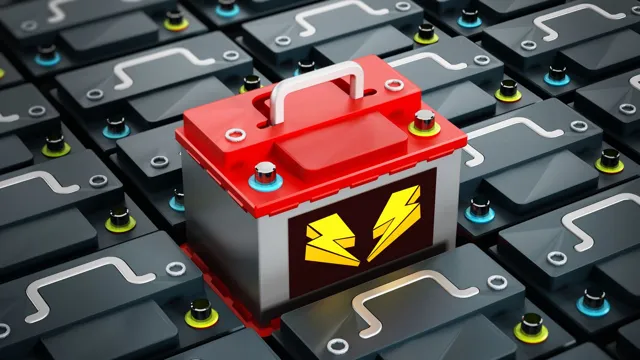
Battery Degradation and Replacement Costs
One of the major limitations of electric vehicles (EVs) is the degradation of their battery over time, which can result in reduced driving range. This can potentially lead to added costs for replacement batteries, which are typically quite expensive. Battery degradation occurs through the natural wear and tear of the battery components, such as the cathode and anode.
Additionally, extreme temperatures can also hasten battery degradation. Despite these limitations, manufacturers have made significant strides in developing batteries that can withstand long-term use while maintaining their capacity, reducing the need for costly replacements. However, it’s important for EV owners to monitor their battery’s health and take necessary precautions to reduce potential battery degradation.
By doing so, they can maximize their driving range while ensuring their battery lasts for as long as possible.
Innovative Battery Technologies
Electric car battery solutions have come a long way in recent years, with innovative technologies emerging to make these vehicles more efficient and reliable than ever. One such advancement is the use of solid-state batteries, which offer a number of benefits over traditional lithium-ion ones. Solid-state batteries have higher energy density, which means they can store more energy in the same amount of space, and they also tend to be safer and longer-lasting.
Another promising technology is flow batteries, which use a liquid electrolyte and can be recharged by simply replacing the electrolyte solution. These batteries are particularly well-suited for large-scale energy storage applications. As electric car technology continues to evolve, it’s clear that battery solutions will play a major role in the industry’s growth and development.
By staying on top of the latest innovations, automakers and consumers alike can ensure that they are making the most of this exciting new era in transportation.
Solid-State Batteries: More Energy-Dense and Longer-Lasting
If you’re looking for an innovative battery technology, then you might consider solid-state batteries. Unlike traditional lithium-ion batteries, solid-state batteries use a solid electrolyte instead of a liquid one. This allows them to pack more energy into a smaller space, making them more energy-dense.
Additionally, they’re longer-lasting, meaning you won’t have to replace them as often as you do with other batteries. This is great news for anyone who relies on batteries for power, whether it’s for their phone, laptop, or electric car. With solid-state batteries, you’ll get more power and a longer lifespan out of your battery, which can make your life easier and less stressful.
So, if you’re in the market for a new battery, consider giving solid-state batteries a try and experience the difference for yourself.
Graphene-Based Batteries: Faster Charging and Lighter Weight
Graphene-based batteries are a revolutionary technology that promises to resolve many of the problems faced by traditional lithium-ion batteries. These innovative batteries offer significant benefits over standard lithium-ion batteries, including faster charging, longer life, and much lighter weight. Graphene is an incredibly strong and lightweight material that conducts electricity with extreme efficiency, making it an ideal material for battery technology.
It also has a huge surface area, which means that graphene-based batteries can pack a lot of power into a small space. This makes them ideal for use in small devices such as smartphones and wearables, as well as in electric cars, where weight and space savings are critical. Furthermore, these batteries offer tremendous charging speeds, enabling a full charge in just minutes.
With graphene-based batteries as the future of technology, this research marks an important milestone in the transition towards new energy technologies.
Lithium-Sulfur Batteries: Higher Energy Capacity and Lower Cost
Lithium-sulfur batteries are quickly becoming a popular option for energy storage due to their higher energy capacity and lower cost compared to traditional lithium-ion batteries. This innovative technology uses sulfur as the cathode instead of the more expensive and heavier materials used in lithium-ion batteries. This not only makes the batteries more affordable, but also lighter and more efficient at storing energy.
Additionally, these batteries have the potential to offer longer cycle life and better environmental performance. As research continues to develop this technology, it could greatly benefit the renewable energy sector by providing a more accessible and sustainable option for energy storage.
Advancements in Battery Management Systems
Electric car battery solutions have come a long way with advancements in battery management systems (BMS). BMS has become an integral part of electric vehicles allowing for sophisticated charging and discharging management, thereby extending battery life and improving performance. Modern BMS sensors provide real-time data on battery temperature, state of charge, and other relevant parameters, allowing the system to mobilize when necessary.
For instance, it can reduce charge rates or even stop charging altogether when the battery is full to avoid overcharging and overheating. Additionally, BMS can balance the charge levels of individual cells in lithium-ion battery packs minimizing cell wear, thus prolonging battery life. Electric car battery solutions equipped with BMS can now deliver longer ranges, reduced charging times and increased efficiency, further driving the transition from gas-powered vehicles to electric cars.
Smart Charging and Discharging
Battery Management Systems As electric vehicles and renewable energy systems become more common, managing the charging and discharging of batteries has become increasingly important. That’s where Battery Management Systems (BMS) come in. Advancements in BMS technology now ensure that batteries are charged intelligently, maximizing their lifespan while reducing charging times.
BMS can also discharge the batteries intelligently, managing the peaks and troughs of energy demand. Burstiness and perplexity in managing battery systems can be challenging, but with advancements in BMS technology, these issues are becoming easier to handle. In a sense, BMS acts as the brain of the battery, controlling its functions and ensuring that it operates optimally.
As such, it is becoming an essential component of electric vehicles and renewable energy systems.
Battery Health Monitoring and Diagnostics
Battery Management Systems Advancements in Battery Management Systems have brought about an exciting era of Battery Health Monitoring and Diagnostics. These systems allow for more reliable and efficient battery lifespan with early detection of potential issues or faults while monitoring the battery’s state and reacting in real-time if necessary. The monitoring system includes a variety of sensor technologies to gather key data such as battery temperature, voltage, and current.
This information is then processed through advanced algorithms and software, determining the battery’s state of health, state of charge, and remaining capacity. With this data, the battery management system can optimize the usage profile and charging rates, thereby extending the battery’s lifespan. Future developments of Battery Management Systems include integrating artificial intelligence to enhance the decision-making process leading to increased accuracy and effectiveness in predicting the battery’s performance.
Overall, battery management systems are integral for achieving the best possible battery performance and lifespan.
The Future of Electric Vehicles with Better Batteries
As the push for more sustainable transportation grows, the focus on electric car battery solutions becomes more important than ever. The current state of batteries offers limitations including range anxiety, long charging times and high cost. However, experts anticipate that better batteries with improved energy density, reduced cost, and a higher lifecycle will revolutionize the industry in the coming years.
Some promising options, such as solid-state batteries, seem to represent the solution to many of these issues and could even outperform traditional lithium-ion batteries. Additionally, the possibility of battery recycling innovations could make these technologies more sustainable and financially efficient. As these advancements continue, the electrification of transportation using better batteries appears to be an increasingly viable and appealing solution for consumers and investors alike.
Conclusion
To put it simply, when it comes to electric car battery solutions, the future is bright and charged up! With innovative advancements in battery technology, alongside a global push towards sustainable energy sources, it’s clear that we’re moving towards a cleaner, greener, and more efficient automotive industry. As electric vehicles become more mainstream, we can expect even more exciting developments in battery technology and charging infrastructure, paving the way for a truly electrifying future on the road.”
FAQs
What are some popular solutions for electric car battery charging?
Popular solutions for electric car battery charging include home charging stations, public charging stations, and fast charging stations.
Can electric car batteries be recycled?
Yes, electric car batteries can be recycled. The materials inside the battery can be reused for other purposes.
What is the average lifespan of an electric car battery?
The average lifespan of an electric car battery is around 8-10 years, but it can vary depending on usage, climate conditions, and maintenance.
How long does it take to charge an electric car battery?
This depends on the type of charger being used and the size of the battery. Generally, home charging stations can take 6-8 hours for a full charge, while fast charging stations can charge up to 80% of the battery in 30 minutes.
